Featured
 A Lost Manuscript Shows the Fire Barack Obama Couldn’t Reveal on the Campaign Trail. By Timothy Shenk / NYT
A Lost Manuscript Shows the Fire Barack Obama Couldn’t Reveal on the Campaign Trail. By Timothy Shenk / NYT
Mr. Obama left Harvard with a blueprint for remaking American democracy. Written with Robert Fisher, a friend and former economics professor, the 250-page manuscript had the working title of “Transformative Politics.”
To understand what Mr. Obama was trying to accomplish with “Transformative Politics,” and why it matters today, you have to start with the problem he was trying to solve. The worldview Mr. Obama brought to Harvard was shaped by his years as a community organizer in Chicago. Driving by shuttered steel mills on his way to ramshackle public housing projects, Mr. Obama came to see deindustrialization and urban decline as two sides of the same broken promise.
Mr. Obama and Mr. Fisher didn’t pretend that racism had been expunged from American life. “Precisely because America is a racist society,” they wrote, “we cannot realistically expect white America to make special concessions towards blacks over the long haul.” Demanding that white Americans grapple with four centuries of racial oppression might be a morally respectable position, but it was terrible politics. Economics were a safer bet. Blue-collar workers of all races, Mr. Obama and Mr. Fisher wrote, “understood in concrete ways the fact that America’s individualist mythology covers up a game that is fixed against them.” Read more
Political / Social
 Herschel Walker’s Candidacy Is Just Insulting. By Jemele Hill / The Atlantic
Herschel Walker’s Candidacy Is Just Insulting. By Jemele Hill / The Atlantic
The contrast with his opponent renders it all the more egregious.
Senator Raphael Warnock of Georgia couldn’t be more different from his Republican opponent, the former football player Herschel Walker – and news coverage of their campaigns in the past week is a perfect example. Warnock didn’t generate a single juicy or humiliating headline. Articles about the Democratic incumbent dutifully describe his issue positions and his campaign strategies. Meanwhile, the Daily Beastreported recently that the staunchly anti-abortion challenger had paid for an abortion that the mother of one of his children underwent. That story prompted Walker’s son Christian to post a bitter rebuke of his father on Twitter. Read more
Related: Donald and Herschel: The Unholy Alliance. By Maureen Dowd / NYT
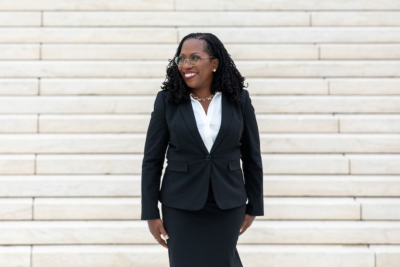 Look Out, Supreme Court, Ketanji Brown Jackson Came to Play. By Maya Wiley / The New Republic
Look Out, Supreme Court, Ketanji Brown Jackson Came to Play. By Maya Wiley / The New Republic
Clarence Thomas sat silent for years before he said a word. The court’s newest justice came out swinging at her first hearing.
The state of Alabama argued that it should be allowed to ignore race in redistricting, which is to say, be color-blind. It’s like saying, as long as no one can show we tried to dilute Black voting power, then we should be able to dilute Black voting power. Jackson pointed to the absurdity of the argument. She said that the Framers themselves adopted the equal protection clause, the Fourteenth Amendment, the Fifteenth Amendment, in a race-conscious way. That they were, in fact, trying to ensure that people who had been discriminated against, the freedmen during the Reconstruction period, were actually made equal with everyone else in society. “That’s not a race-neutral or race-blind idea,” Jackson said. Can Jackson help pull our democracy, teetering precariously at the edge of a cliff of hate, fear, and division, back from the brink? Read more
Related: Why Black people feel Jackson’s ‘seat at the table’ is ours, too. By Jonathan Capeheart / Wash Post
Related: The Supreme Court Is Ready to Take Down More of the Voting Rights Act. By Elie Mystal / The Nation
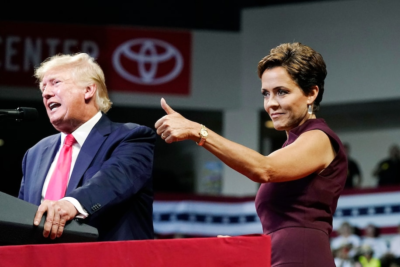 The MAGA GOP has never been about ‘life.’ Only power. By Jenifer Rubin / Wash Post
The MAGA GOP has never been about ‘life.’ Only power. By Jenifer Rubin / Wash Post
Kari Lake, the Republican candidate for governor in Arizona, gives a thumbs-up to the crowd as former president Donald Trump speaks during a rally in Prescott, Ariz., on July 22. (Ross D. Franklin/AP)
The cat’s been out of the bag for some time regarding Republicans’ insincere support for “life.” If “life” were the issue when it comes to abortion, the party would not put reproductive health and lives at risk with forced-birth laws. For that matter, a pro-life politician would not oppose effective gun-safety laws; would not oppose mask edicts or discourage vaccinations for the coronavirus; and would not push to cut Medicaid and hobble the Affordable Care Act. However, never has it been more apparent how utterly unprincipled the party is when it comes to an issue it has used for decades to woo its base. Read more
Related: Republicans running on race, see gains in school board election races. By Chris Quintana / USA Today
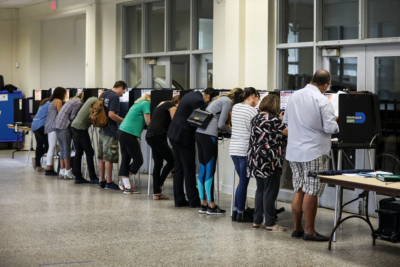 A big chunk of Latino independent voters are undecided ahead of midterms, poll shows. By Suzanne Gamboa / NBC News
A big chunk of Latino independent voters are undecided ahead of midterms, poll shows. By Suzanne Gamboa / NBC News
The percentage of Hispanic independent voters who say they’re not sure which party will get their vote is twice as high as in 2018, according to the latest NALEO tracking poll.
About 40% of Latinos who consider themselves independents say they remain undecided whether to vote for Democrats or Republicans in congressional and Senate races, the fourth week of a tracking poll shows. The indecision was captured in the weekly tracking poll for the National Association of Latino Elected and Appointed Officials Educational Fund, known as NALEO. It comes with about six weeks to go before the midterm elections Nov. 8. Read more
 FEMA Says Hurricane Aid Was Sent to Black Neighborhoods. Residents Haven’t Seen It. By Margo Snipe / Capital B
FEMA Says Hurricane Aid Was Sent to Black Neighborhoods. Residents Haven’t Seen It. By Margo Snipe / Capital B
As Black Floridians await federal aid to rebuild, they are starting the long road to recovery after Hurricane Ian
Volunteers tossed cases of water off the back of a truck from Tennessee outside of First Assembly Cornerstone Church. Inside, a group of women filled to-go containers with macaroni and cheese, pulled pork, sandwich buns, and corn. It had been a week since Hurricane Ian devastated this Gulf Coast city, uprooting decades-old trees and snapping power lines. And as President Joe Biden made a midweek visit to survey the damage by helicopter, some residents of the predominantly Black Dunbar neighborhood were still without power, continuing to tarp their roofs and load their cars with water and hot meals in Florida’s scorching heat. Read more
 The Stunning Neglect and Racist Politics Behind Alabama’s Prison Strike. By Isaac Chotiner / The New Yorker
The Stunning Neglect and Racist Politics Behind Alabama’s Prison Strike. By Isaac Chotiner / The New Yorker
In 2020, the Department of Justice sued the state for running prisons that were “riddled” with violence. Since then, things have got worse.
Beth Shelburne is a journalist in Alabama who has been covering the state of Alabama’s prisons. As part of the A.C.L.U.’s Smart Justice Campaign, she is also the author of many of the organization’s reports on Alabama’s prisons. (Her Substack column is called “Moth to Flame.”) We recently spoke by phone. During our conversation, which has been edited for length and clarity, we discussed the historical roots of the current problems in Alabama’s prisons, why conditions have deteriorated in the past several years, and divisions among the prisoners about how far to take their current protest. Read more
 Affirmative action bans make selective colleges less diverse – a national ban will do the same. By Natasha Warikoo / The Conversation
Affirmative action bans make selective colleges less diverse – a national ban will do the same. By Natasha Warikoo / The Conversation
The Supreme Court is scheduled to hear arguments in two lawsuits on Oct. 31, 2022, brought by a group that opposes affirmative action in college admissions. Here, Natasha Warikoo, a sociology professor at Tufts University and author of the newly released “Is Affirmative Action Fair?: The Myth of Equity in College Admissions,” shares insights on how the racial and ethnic makeup of student bodies at selective colleges and universities will change if the Supreme Court decides to outlaw affirmative action.
Currently, many selective colleges consider race when they make decisions about which students to admit. In several cases since 1978, the U.S. Supreme Court has affirmed that it is constitutional to do so to ensure diversity on campus. A ruling in favor of Students for Fair Admissions, the plaintiffs in the case, would require all colleges – both private and public – to no longer consider race when they make admissions decisions. Read more
Related: How a Still-Segregated Country Holds Us All Back. Jamelle Bouie / NYT
 Why Celeste Ng’s new book places an Asian American mom in the eye of a social justice movement. By Kimmy Yam / NBC News
Why Celeste Ng’s new book places an Asian American mom in the eye of a social justice movement. By Kimmy Yam / NBC News
“The way that you raise your children and the act of having children and trying to raise them into members of society feels very political to me,” the author said.
Author Celeste Ng’s latest book, “Our Missing Hearts,” is her most political yet, and that’s why, she said, it was appropriate to center the relationship between mother Margaret Miu and her 12-year-old son Bird. The novel, which came out Tuesday, largely parallels the climate of the past few years, mirroring not only the “rise of the far right” amid the Trump administration and scapegoating of Asian American communities during the pandemic, but also the racial reckoning and resistance efforts that emerged alongside it, Ng said. For the author, it was critical to place Miu, an Asian American mother and fugitive poet, at the forefront of a protest movement in her book. Read more
Related: Asian and Native American female lawyers get the least amount of big law business, study finds. By
 US breast cancer rate drops 43% in three decades, but racial disparities remain, American Cancer Society report finds. By Jacqueline Howard / CNN
US breast cancer rate drops 43% in three decades, but racial disparities remain, American Cancer Society report finds. By Jacqueline Howard / CNN
The breast cancer death rate in the United States has dropped significantly, but Black women continue to be more likely to die from the disease despite having a lower incidence of it, according to a new American Cancer Society report.
The study published this week in the CA: A Cancer Journal for Clinicians finds that in total, the death rate dropped by 43% within three decades, from 1989 to 2020, translating to 460,000 fewer breast cancer deaths during that time. When the data were analyzed by race, Black women had a lower incidence rate of breast cancer versus White women, but the death rate was 40% higher in Black women overall. Read more
Ethics / Morality / Religion
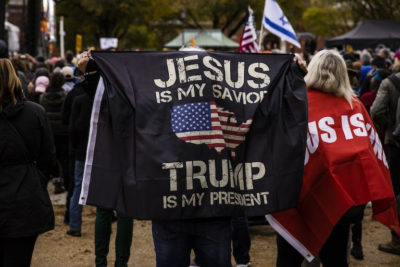 American Christianity Is on a Path Toward Being a Tool of Theocratic Authoritarianism. By Bryan Tannehill / The New Republic
American Christianity Is on a Path Toward Being a Tool of Theocratic Authoritarianism. By Bryan Tannehill / The New Republic
As nonevangelical faiths lose adherents, it won’t be too long before the vast majority of Christians in America are seriously right wing. This is not good.
There have been plenty of articles by very serious people who wring their hands and bemoan the loss of a common U.S. religion (and who ignore that there have always been Muslims, Jews, deists, atheists, agnostics, and other non-Christians here). Where will communities meet and bond? Where will morality come from? What will tie people together? However, such questions entirely miss the point that religion in this country has been a singularly divisive factor for well over a decade and is only becoming more so. Read more
 Are American Christians on the path to severe persecution for their faith? By David Curry / Religion News Service
Are American Christians on the path to severe persecution for their faith? By David Curry / Religion News Service
Christian politicians in America have been attacked for their religious convictions, but Christians in other parts of the world face much more than mere criticism.
While we cannot deny that Christians in America today experience discomforts, inconveniences and sometimes even social ostracization, these instances simply do not rise to the level of the horror that countless global Christians face every day. Moreover, there is very little evidence that this level of carnage is coming to the United States soon. Read more
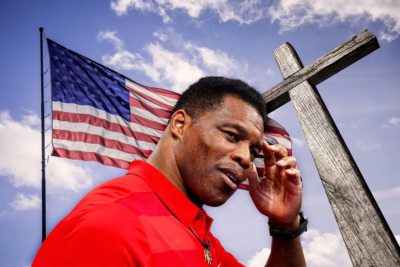 Herschel Walker’s abortion scandal won’t alienate Christian right voters — here’s why. By Amanda Marcotte / Salon
Herschel Walker’s abortion scandal won’t alienate Christian right voters — here’s why. By Amanda Marcotte / Salon
Trump showed Republican voters are fine with sexual freedom — for straight conservative men
It is unlikely that Republicans actually believe Walker over this anonymous woman, but they don’t have to. They simply do not care. The abortion issue is not and never has been about “life.” Abortion bans are about controlling women and punishing female sexuality, full stop. Walker is a straight cisgender man and a Republican. That means, as far as the Christian right is concerned, he can do whatever he wants when it comes to sex. Read more
Related: The Herschel Walker case belies the case for religion in politics. At least when it comes to white evangelicals. By Mark Silk / RNS
Historical / Cultural
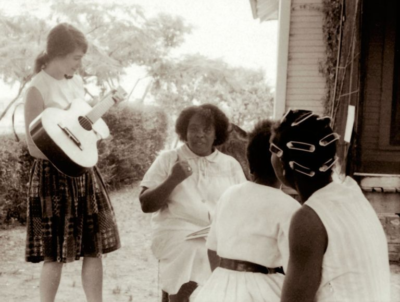 Fannie Lou Hamer’s Message to Contemporary America. By Keisha N. Blain / AAIHS
Fannie Lou Hamer’s Message to Contemporary America. By Keisha N. Blain / AAIHS
Until I Am Free: Fannie Lou Hamer’s Enduring Message to America was a book that I felt compelled to write. Shown is Fannie Lou Hamer during the Freedom Summer Project, Mississippi, 1964 (Flickr)
I first encountered Fannie Lou Hamer during my senior year of college. It was 2008, and I had enrolled in a class on the civil rights movement. The professor, Anne Bailey, made the strategic decision to center the voices and experiences of lesser-known activists in the movement. While we certainly engaged a variety of texts on the most iconic figures, we also spent time reading about—and reflecting on—the “ordinary” people who made the movement possible. It is in this space that I “met” Mrs. Fannie Lou Hamer, a woman whose story immediately captivated me. Read more
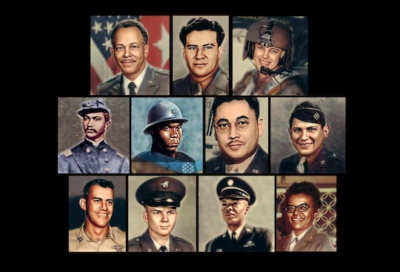 How Black troops lost out in bid to sever Army post’s Confederate ties. By Alex Horton / Wash Post
How Black troops lost out in bid to sever Army post’s Confederate ties. By Alex Horton / Wash Post
In the effort to rename Fort Gordon, community leaders in Augusta, Ga., declined an opportunity to elevate a person of color. They picked their own finalist: Dwight Eisenhower.
Five Black soldiers — a repudiation of John Brown Gordon himself — were among the diverse slate of 10 finalists presented to Augusta-area leaders in April. In the end, however, the commission chose to go in another direction entirely and rename the base after Eisenhower — bypassing the five Black candidates and other groundbreaking people of color. Read more
 Philadelphia apologizes for experiments on Black inmates. By AP and NPR
Philadelphia apologizes for experiments on Black inmates. By AP and NPR
Edward Anthony speaks of his time at Holmesburg Prison in Philadelphia and the tests in which he participated while an inmate, pictured here on Oct. 24, 2007.
The city of Philadelphia issued an apology Thursday for the unethical medical experiments performed on mostly Black inmates at its Holmesburg Prison from the 1950s through the 1970s. The move comes after community activists and families of some of those inmates raised the need for a formal apology. It also follows a string of apologies from various U.S. cities over historically racist policies or wrongdoing in the wake of the nationwide racial reckoning after the killing of George Floyd by a Minneapolis police officer. Read more
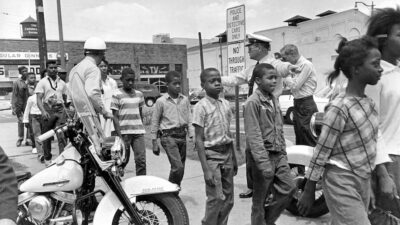 Did the civil rights movement use military tactics to topple Jim Crow? By Kevin Boyle / Wash Post
Did the civil rights movement use military tactics to topple Jim Crow? By Kevin Boyle / Wash Post
Police lead Black schoolchildren to jail in May 1963 after their arrest for protesting racial discrimination in Birmingham, Ala. (Bill Hudson/AP)
Behind Thomas Ricks’s new book, “Waging a Good War: A Military History of the Civil Rights Movement, 1954-1968,” lies an obvious question. In the 20th century, the world’s militaries unleashed a wave of destruction unprecedented in human history, devastating vast stretches of countryside, leveling entire cities and killing more than 100 million people, a portion of them with genocidal intent. So what’s to be gained by casting one of the century’s greatest nonviolent movements in martial terms, by thinking of it as yet another army fighting yet another war? Read more
 NASA astronaut Nicole Mann now first Native American woman in space. By Scott Gleeson / USA Today
NASA astronaut Nicole Mann now first Native American woman in space. By Scott Gleeson / USA Today
Marine Colonel Nicole Aunapu Mann made history as one of a four-member astronaut crew to blast off from Florida bound for the International Space Station. Mann, 45, became the first Native American woman to launch into space.
Mann, a member of the Wailacki of the Round Valley Indian Tribes in California, said she hopes future generations of Native Americans can feel inspired by her mission. “(I hope it) will inspire young Native American children to follow their dreams and realize that some of those barriers that are there or used to be there are being broken down,” she told BBC. “Anytime we are able to do something that is a first, or wasn’t done in the past, it’s so important. They have these opportunities.” Read more
 Killings of rappers are more than just a hip-hop problem, experts say. By Char Adams / NBC News
Killings of rappers are more than just a hip-hop problem, experts say. By Char Adams / NBC News
The fatal shootings of high-profile rappers are igniting familiar conversations about gun violence and corporate culpability. From left, rappers Pop Smoke, Young Dolph and PnB Rock.
“It’s a reflection of the problem of gun violence in the larger society, and violence in general in America. You have to think critically about oppression and the larger context we live in,” she said. Gun violence is “a part of the condition of Black people in society, everything that is dangerous and harmful to the larger society. There’s always going to be a disparity in our communities. It’s all systemic, it’s a part of the way society is structured,” Richardson added. Read more
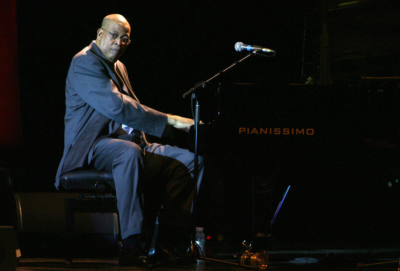 Black Music Sunday: ¡Feliz cumpleaños! Let’s celebrate Chucho Valdés’ 81st birthday. By Denise Oliver Velez / Daily Kos
Black Music Sunday: ¡Feliz cumpleaños! Let’s celebrate Chucho Valdés’ 81st birthday. By Denise Oliver Velez / Daily Kos
Sept. 15-Oct. 15 is Hispanic Heritage Month here in the U.S. Lest anyone forget that some of our greatest Latino musical artists were and are Afro-Latino, for this week’s Black Music Sunday, we’re going to pay tribute to multiple award-winning pianist and composer Chucho Valdés, born as Dionisio de Jesús Valdés Rodríguez on Oct. 9, 1941, in Quivicán, Cuba. Young Chucho—now 81—was the son of prominent Latin jazz pianist Ramon Bebo Valdés, and began playing the piano as a toddler. He would grow up to become one of the most famous innovators in the world of Afro-Latin jazz and in spite of the fraught politics between the United States and Cuba, he would garner some of the most prestigious awards in the American musical academy. Read more
Sports
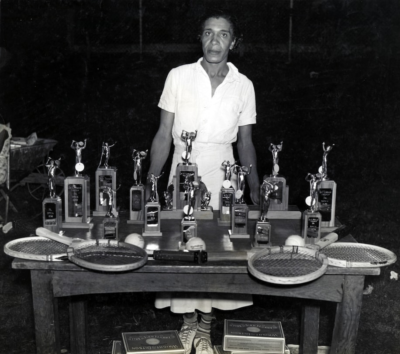 Long before Serena Williams, there was Ora Washington. Few remember her. By Pamela Grundy / Wash Post
Long before Serena Williams, there was Ora Washington. Few remember her. By Pamela Grundy / Wash Post
In 1976, when the founders of the Black Athletes Hall of Fame put together that year’s class of inductees, they decided to honor Ora Washington, the preeminent Black female athlete of the early-20th century. But for Washington herself it was too late. She had died in Philadelphia five years earlier.
Washington dominated Black women’s tennis in the 1920s and 1930s, winning the singles title of the all-Black American Tennis Association every year but one from 1929 to 1937, and taking 12 straight doubles titles from 1925 to 1936. She won her final ATA championship in her late forties, when she and partner George Stewart defeated Walter Johnson and rising teenage star Althea Gibson for the 1947 mixed doubles crown. Read more
 The sanctimonious baseball purists want to elevate Aaron Judge. Don’t let them. By Kevin B. Blackstone / Wash Post
The sanctimonious baseball purists want to elevate Aaron Judge. Don’t let them. By Kevin B. Blackstone / Wash Post
Because of historical denialism, it was reported in some placesthat New York Yankees slugger Aaron Judge onTuesdaybroke Major League Baseball’s single-season home run record with his 62nd blast. He didn’t. The record is 73, set by should-be Hall of Fame outfielder Barry Bonds on Oct. 7, 2001. Much of the sports journalism profession should regret the error.
Cap Anson’s Hall of Fame plaque venerates him as the greatest hitter and player-manager of the 19th century but ignores his role establishing the game’s color line. Many around the game still celebrate Babe Ruth as the greatest player and slugger despite his excelling during the 60 years when Black athletes weren’t allowed to play the game — under a racist policy spearheaded by Anson that the game’s historians neutered in description as a mere “gentlemen’s agreement.”“[Bonds’s 73 is] the record,” Judge told the San Francisco Chronicle last month. “I watched him do it. I stayed up late watching him do it. That’s the record. No one can take that from him.” Read more
 Inside the rise of Victor Wembanyama: ‘When I saw him, I knew he was just special.’ By Marc J. Spears / Andscape
Inside the rise of Victor Wembanyama: ‘When I saw him, I knew he was just special.’ By Marc J. Spears / Andscape
Ahead of his first games on American soil, the projected No. 1 pick in the 2023 NBA draft has the basketball world buzzing about his talent and future
Nicolas Batum was walking out of a French men’s basketball team practice in suburban Paris four years ago when this giant kid caught his eye and stopped him from departing. The 14-year-old wowed Batum as he gracefully ran the floor at 6-feet-11, had a complete offensive game and blocked shots and dunked the ball with ease. While it’s usually kids who introduce themselves to NBA players, the Los Angeles Clippers forward made a point to introduce himself to this kid named Victor Wembanyama. Read more
 How rich is LeBron James? Here’s a breakdown of his wealth. By Kristopher J. Brooks / CBS News
How rich is LeBron James? Here’s a breakdown of his wealth. By Kristopher J. Brooks / CBS News
The Los Angeles Laker star became a billionaire earlier this year due to his mix of real estate holdings, ownership in sports teams, and many sponsorship and endorsement deals, according to a Forbes estimate that pegged his net worth at $1.2 billion. That milestone is one James has been working toward for almost a decade. In a 2014 interview with GQ, he said he was working to maximize his business ventures and that he would be excited to one day hit the billion-dollar mark. Read more
Related: Lakers’ LeBron James wants to own NBA expansion team in Las Vegas. By Ben Golliver / Wash Post
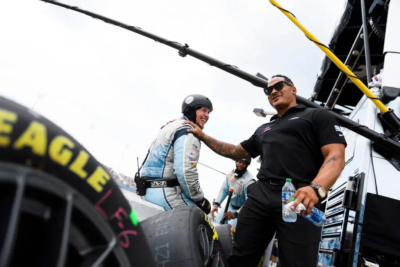 He Gave Up Football for NASCAR. Then He Changed the Sport. By Jonthan Abrams / NYT
He Gave Up Football for NASCAR. Then He Changed the Sport. By Jonthan Abrams / NYT
Dion Williams, who is Black and goes by the nickname Rocko, has helped upend the perception of who belongs in NASCAR.
Dion Williams had left behind football, with teammates from all over the country, for the racing track in North Carolina, where some of his fellow pit-crew members had not traveled outside the state except for races in far-flung Southern cities. It felt simultaneously strange and familiar. He was also Black in a sport in which the Confederate flag still flew at some races. He wore Air Jordans on his feet and blasted hip-hop from his headphones. He was an athlete, but he was stepping into a role traditionally filled by mechanics. Read more
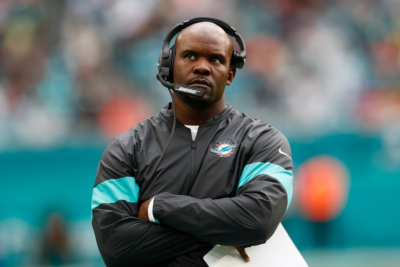 The NFL is not doing all it can to help Black coaches. By the Editorial Board / Wash Post
The NFL is not doing all it can to help Black coaches. By the Editorial Board / Wash Post
Former Miami Dolphins head coach Brian Flores, now an assistant with the Pittsburgh Steelers, filed a lawsuit against the NFL and three organizations. (Brynn Anderson/AP)
“Black Coaches in the National Football League: Superior Performance, Inferior Opportunities.” That was the title of a 2002 report by famed attorney Johnnie Cochran Jr. and civil rights lawyer Cyrus Mehri detailing how Black coaches averaged more wins than their White counterparts but found it harder to get hired and easier to be fired. Nearly 20 years later, nothing has changed, as a damning Post investigation underscores. The NFL can do more. Compiling and analyzing three decades of data, a team of Post reporters — including Dave Sheinin, Michael Lee, Emily Giambalvo, Artur Galocha and Clara Ence Morse — revealed the long-standing challenges facing the league’s Black coaches. They are vastly underrepresented; while nearly 60 percent of NFL players are Black, just 11 percent of full-time head coaches since 1990 have been Black. Read more
Site Information
Articles appearing in the Digest are archived on our home page. And at the top of this page register your email to receive notification of new editions of Race Inquiry Digest.
Click here for earlier Digests. The site is searchable by name or topic. See “search” at the top of this page.
About Race Inquiry and Race Inquiry Digest. The Digest is published on Mondays and Thursdays.
Use the customized buttons below to share the Digest in an email, or post to your Facebook, Linkedin or Twitter accounts.